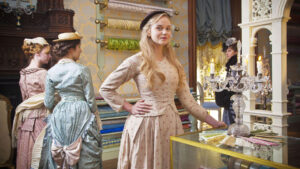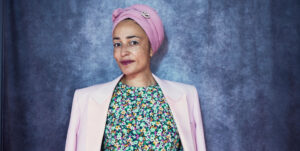A certain kind of reader is unlikely to accept any kind of argument for P. G. Wodehouse’s Mike. Set in a private, all-boys school, the novel features a main character, the Mike of the title, with few distinguishing traits beyond being a good egg and an even better cricketer. Is it, perhaps, a satire of such institutions and people? Far from it: the main criticism of Sedleigh, the school in which the novel’s second half is set, is that it isn’t very good at cricket. The boyish things the pupils do are not grounds for anxiety or scorn. None of them appear in the least bit traumatised by the experience of being sent off to boarding school, sometimes by parents in some remote colonial outpost.
The reader who looks to fiction for a critique of something or other will find no critique here of anything at all. If there is a glimmer of hope when Mike’s pal Psmith reveals himself a monocle-wearing eccentric and declares himself a socialist, the glimmer will fade once it emerges that his socialism doesn’t extend beyond addressing everyone as “Comrade”, and his eccentricity is not a sign of alienation from the middle-class world he happily inhabits. Psmith and his creator find many things about that world ridiculous — but not contemptible.
The sort of reader I have in mind is most likely Left-wing in their politics, suspicious of anything that mocks a social world not as way of, but as a substitute for, changing it. But the demand for seriousness once came from conservatives worried about the essential frivolity of novels — books that didn’t instruct their readers in manners or morals. It was that view to which Jane Austen was responding in the much-quoted passage of Northanger Abbey where she defends novels as the works “in which the greatest powers of the mind are displayed, in which the most thorough knowledge of human nature, the happiest delineation of its varieties, the liveliest effusions of wit and humour, are conveyed.”
Few writers have seemed to care so little about importance as Wodehouse. His endless linguistic ingenuity made admirers of Left-wing authors such as George Orwell and Christopher Hitchens — the effortless succession of wild similes, the clever deconstruction of weary clichés. That and the mad but intricate plots. But what seems absurd is the idea that anyone might be drawn to Wodehouse for his themes, or what you might call his “ethic”.
In fact, it isn’t absurd at all; it seems so because we only count “serious” themes as real, and conflate having an ethic with being didactic. Yet why shouldn’t a comic view of the world be less insightful than a tragic or an angry one? “If you take life fairly easily”, Wodehouse once remarked to an interviewer, “then you take a humorous view of things. It’s probably because you were born that way”.
His words here recall the lyrics of Gilbert and Sullivan: “Nature always does contrive / That every boy and every gal / That’s born into the world alive / Is either a little Liberal / Or else a little Conservative!’ There’s a misplaced debate among Wodehouse’s champions and detractors about exactly where he fits on the political spectrum. Liberal, say readers who see his jokes at the expense of his upper-class characters as satire. Conservative, say readers who notice that he, “in creating such characters as Hildebrand Spencer Poyns de Burgh John Hanneyside Coombe-Crombie, 12th Earl of Dreever… is not really attacking the social hierarchy”.
Those last words are from George Orwell’s essay, “In Defence of P. G. Wodehouse”. He was writing just after the war, when the uproar about Wodehouse’s idiotic (but well-intentioned) broadcasts on German radio in 1941 were fresh in public memory: Wodehouse was in need of a robust defence. But Orwell, a political man through and through, could not avoid, even when defending Wodehouse’s lack of political nous, adopting a reductive view of the man’s writing. “Wodehouse’s real sin”, he wrote, “has been to present the English upper classes as much nicer people than they are”.
In Orwell’s worldview, whole classes — as distinct from the individuals who comprise them — might have their niceness appraised. Wodehouse, by contrast, sees his characters as individuals — paradoxically so, given how many of them were stereotypes. He once described his approach to his later fiction as “making the thing a sort of musical comedy without music, and ignoring real life altogether”. But the very earliest boarding school novels, animated though they are by a basically comic spirit, are not yet the farces for which he became famous.
Few other stories published in the same magazines that published Wodehouse’s juvenilia stand up today. The clichés are too numerous, the plots entirely interchangeable. But Wodehouse’s early novels hold up surprisingly well. In an age when public schoolboys seem to divided themselves into sentimental nostalgists on the one hand and angry rebels on the other, Wodehouse distinguished himself by the matter-of-fact tone in which he wrote of boys’ attitudes to their schools:
“The average public schoolboy likes his school… He is sorry to leave and he likes going back at the end of the holidays, but as for any passionate, deep-seated love of the place, he would think it rather bad form than otherwise.”
One can’t doubt that the experience of boarding — involuntary separation from family, the casual brutality of masters and other schoolboys — must have left many boys with scars they carried into adulthood. There is no shortage of memoirs by men who survived the ordeal. But Wodehouse speaks for what must have been the silent majority: men for whom boarding school had its challenges but was not conspicuously more traumatising than any other place they might have spent their childhood and adolescence.
His protagonist, Mike, is a representative of that untraumatised majority. He is a straightforward teenage boy, interested above all in sport. Transplanted midway through the book from a school with fine cricketing traditions, Wrykyn, he finds himself at Sedleigh, a place with an undistinguished sporting tradition. “Mike’s outlook on life,” Wodehouse tell us, “was that of a cricketer, pure and simple. What had Sedleigh ever done? What were they ever likely to do? Whom did they play? What Old Sedleighan had ever done anything in cricket?”
But at Sedleigh, he finds himself set against another character, Adair, to whom “Sedleigh was almost a religion … a public school among public schools, a lump of radium.” (In this we see the beginnings of the grown-up Wodehouse’s talent for the entirely original analogy.) Adair wants Mike to play for the school side; Mike prefers to play for a village team. Like countless schoolboy antagonists, they fight. A little while later, their reconciliation is dramatised in a simple exchange when someone describes Adair as “not a bad cove”, and Mike replies, simply: “He’s all right.”
There is no mawkish sentiment, but equally, no affectations of adult toughness. The boys have their feelings, but they are the feelings one can imagine real boys having in that time and place. They sort out their problems between themselves and learn to live with other. Each boy has his place in the little world of the school. The book’s most celebrated odd-couple pairing of Mike and a much more flamboyantly eccentric character than Adair: Psmith. He is, of course, “really” a Smith, but informs the bemused Mike when he first meets him: “If you ever have occasion to write to me, would you mind sticking a P at the beginning of my name? P-s-m-i-t-h. See? There are too many Smiths.”
Part of what’s so funny about Psmith is that the silliness of how he spells his name is only apparent in writing. It was Wodehouse’s first really good joke and foretold the many glorious jokes to come — Jeeves and Wooster, Lord Emsworth and his enormous pig. It also encapsulates the wholesomeness that distinguishes him from other comic writers — whose comedy begins in anger and vengefulness. Saki, like Wodehouse, had scary aunts, but took pleasure when they were killed by a vicious ferret. Roald Dahl’s nasty grown-ups are set up for some horrible and ingenious punishment. If political-minded readers are disappointed that Wodehouse doesn’t care more for justice, they might remind themselves that he cared even less for revenge: most of us have a hard time telling the desire for fairness apart from the desire to get even.
We live in a world anxious again to divide people into goodies and baddies, their views into liberal and conservative. Wodehouse was unusual in seeing that it is enough to divide them into “all right” and “bad coves” — in other words, those we like and those we could learn to live with. If that didn’t make him sound like a more solemn figure than in fact he was, you might even call that the deep insight behind his comedy. The message — if that’s not too pompous a thing to ascribe to Wodehouse — is: it takes all sorts to make a world. The right word for the author’s ethic — such as it was — is not “liberalism”, which is the label for a political philosophy; the imputation of any such thing would indeed have made him seriously ill. What he possessed was a rarer, more precious thing: the virtue of liberality.
Wodehouse’s world is one in which the monocled dandy can be friends with the school jock. (A great lover of American English, he would not have protested the Americanism.) And both can live, eventually if not right off the bat, in harmony with the idealist and the prig. Is that an ethical ideal? Not, perhaps, in a sense that Orwell would have recognised. But that only tells us that some people have too narrow a view of the ethical. Whatever those words — ethical, political — mean, they must have something to do with living together with other people. The desire to transform other people so that they live up to our own ideal is at the root of so much political violence. The idea, especially at Christmas, of a writer who doesn’t want to change you — or anyone or anything — is all the more attractive, for just that reason.
Disclaimer
Some of the posts we share are controversial and we do not necessarily agree with them in the whole extend. Sometimes we agree with the content or part of it but we do not agree with the narration or language. Nevertheless we find them somehow interesting, valuable and/or informative or we share them, because we strongly believe in freedom of speech, free press and journalism. We strongly encourage you to have a critical approach to all the content, do your own research and analysis to build your own opinion.
We would be glad to have your feedback.
Source: UnHerd Read the original article here: https://unherd.com/





